Kenneth Atchity's Blog, page 13
October 21, 2024
Story Merchant E-Book Deal: The Dark Madonna: A Fable of Resiliency and Imagination by Nicolas Bazan
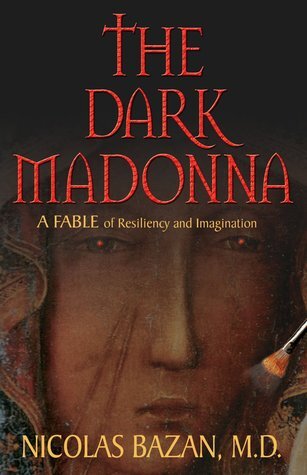
AVAILABLE ON AMAZON
An American neuroscientist becomes embroiled in an international mystery that explores the meaning of miracles.
While attending a scientific conference in Poland New Orleans neuroscientist, Dr. Alvaro Cruz, visits Auschwitz and faces the ghosts of his own harrowing escape from Argentina’s “Dirty War” of the 1970’s.
When he and his wife meet an American artist-priest just outside the entrance of the notorious concentration camp Alvaro is inexplicably drawn to this enigmatic man and his stories about the icon of Catholic Poland known as “The Black Madonna” and a religious vision he experienced as a young art student. After returning to Krakow Alvaro can’t get the comments and demeanor of young Father Stephen out of his mind.
When Alvaro’s colleague invites him to visit the Jasna Gora Monastery where the famed Black Madonna of Częstochowa is housed he jumps at the opportunity.
During his visit to the monastery an elderly woman becomes hysterical about the changed appearance of the Madonna, and suffers an epileptic seizure ; she insists this is not the real Black Madonna, confirming his own odd sensation that the painting was not authentic!
In his obsession with discovering the truth Alvaro begins to piece together fragments of the complex mystery surrounding the icon’s history. What his findings reveal, the real story of the Black Madonna and the people charged with protecting her, could never have been anticipated. What comes to light is a stunning revelation not only about the painting but also about human frailty and our mind’s ability to overcome it.
Like Bazan’s previous Alvaro Cruz novel, Una Vida: A Fable of Music and the Mind, The Dark Madonna: A Fable of Imagination and Resiliency is a compelling narrative interplay of religion, science, culture, and art. Where scientific explanation ends and religious mystery begins lies the open synapse that connects human with divine.
FIVE STAR REVIEW:
The Dark Madonna: A Fable of Resiliency and Imagination by Nicolas Bazan is absolutely mesmerizing with its intriguing blend of fact and fiction! With few pages, the tale of art forgery, greed, and religious beliefs and mysteries leads a scholar on a journey across continents and cultures that left me wanting more from this brilliant author.
Nicolas Bazan has written with a passionate pen, telling his story in the first person, deeply emotional and moving, almost like a pilgrimage of self-discovery and inner awakening as I was taken to ghostly remains of the German prison camps, where the determination to survive and the spirit of those who died there could be felt in the air. On visiting Poland, almost drawn by fate, our main character finds his scientific expertise put to good use when a sacred relic appears to be a clever forgery and a young religious man goes missing. Who is behind this great deception of the faith of the masses? Will the vandal be found? Will the relic be found? Were the reasons behind its theft truly evil or misguided? Can the answer to a religious mystery be found in science?
Wonderfully entertaining and well-written, this short novella feels like a much longer work with its attention to detail and deeply thought-out plot.
I highly recommend it!
October 18, 2024
Guest Post: Shame Is a Deep Well by Dennis Palumbo
CREATIVE MINDS: Psychotherapeutic Approaches and Insights
“Art is everywhere, except it has to pass through a creative mind.”
In the inaugural entry in this column, I addressed the issue of creative blocks, specifically focusing on writers' block. And while being blocked is common to most creatives at some point in their work (due to the fact that, frankly, making good art is hard), I posited that it was the self-invalidating meanings that the patient associates with being blocked that amplifies their distress. These meanings can run the gamut from self-recriminating beliefs about oneself as a person or an artist, to lacerating comparisons between oneself and the imagined ease of creative execution available to others.
In this column, I want to address a similar, though distinct, creative difficulty; namely, procrastination. To suggest ways to conceptualize it for both creative patients and, in a similar way, their clinicians.
Two personal associations with procrastination might serve as guideposts; the first is from my work in advertising on the East Coast. A lifetime ago, I was a young copywriter at an ad agency. One night, invited to dinner by one of the firm’s biggest and most successful clients, I excused myself to use the bathroom, which was at the end of a broad upstairs hallway. To my surprise, taking up most of the space on one of the walls was a colorful logo—the familiar image from the current Nike shoes ad. Atop the image were the equally-familiar words: “Just do it!”
Later, when I mentioned this huge wall graphic to our client, he said that he wanted something that he had see every morning and every night to keep him inspired and motivated. Further, he believed that adherence to this simple exhortation had contributed to his business success.
The second association I have with the concept of procrastination derives from the fact that, despite being a full-time therapist in private practice, I have moonlighted over the years as a mystery author. The very first line of my debut mystery novel, Mirror Image, is "Shame is a deep well."
Why these 2 distinct (and distinctly different) associations? In the first case, it is because “Just do it!” is what many artists struggling with procrastination routinely tell themselves; or, just as often, are told by others, from spouses to colleagues to seemingly more motivated friends. This despite the fact that telling a procrastinator to "just do it" is as helpful as telling a depressed person to "cheer up," and a distraught or grieving person to "get over it."
Admonitions to merely "stop procrastinating and get on with it," whether in answer to the hectoring voice in one's own head or the barely-concealed frustration of intimates, rarely addresses the issue. In fact, if anything, it reaffirms that which, in my view, underlies most instances of procrastination: shame.
Or, to put it more clearly, fear of shameful self-exposure. As I have seen in over 30 years treating creative patients of all stripes struggling with procrastination, such shame is indeed a deep well.
In my studies on the subject, I have read various explanations as to the root causes of procrastination, from simple anxiety to low self-confidence, from a lack of motivation to do unpleasant tasks to merely a tendency to ruminate. In my view, and in both my personal and clinical experience, these concepts woefully miss the mark. They rely on a conventional and unconvincing set of assumptions about the procrastinator, and, frankly, seem to be a “blame the victim” response to the issue. (Not to mention the fact that many individuals are willing to do any number of unpleasant tasks to avoid confronting their reluctance to start or continue their creative project.)
If, as I will try to argue, procrastination is primarily a function of the fear of shameful self-exposure, what makes it so insidious and how many forms does this fear take? What makes treating the creative patient grappling with procrastination so difficult is that the underlying shame has myriad origins. As H.L. Mencken noted, “There is always an easy solution to every human problem—neat, plausible and wrong.” Just as there is no one-size-fits-all approach to creative blocks, there is no uniform approach to dealing with procrastination. Not without narrowing in on the shame, and the possible meanings that birthed that shame.
Which is not to say that there are not a range of similar issues behind procrastination. Over the years, I have treated many PhD candidates from a variety of fields as they struggle to finish their dissertations and defend their paper before their committee. It is a common joke among academics that often these candidates take many years to complete their work, always seeking new sources to support their thesis, always revising it whenever a new book or study appears that might provide additional ammunition for their argument.
Even the terminology invites suspicion. These candidates do not present their work to the committee; they defend it, a position that practically invites the possibility of shameful self-exposure.
In fact, one such patient, a PhD candidate who had spent years researching and writing her thesis in anthropology (ie, procrastinating), explained it with wry self-awareness.
“Did you ever see that movie, Defending Your Life, with Albert Brooks?” she asked. “That’s what I feel like I’m doing. I have to defend my life choices, my ambitions. If I don’t get my PhD, I’ve failed. After all these years, I’m…”
“Exposed?” I offered.
“Exposed, revealed. Whatever you want to call it.”
And no wonder. Between submitting a dissertation and then having to defend it before the empaneled committee, many candidates experience an understandable parental transference with those judging them. That is why the treatment for these patients involves a thorough exploration of how their particular families of origin invoked and embedded iron-clad ideas around success and failure, self-worth and self-recrimination. And how these conceptual myths affect the patient’s belief in their intrinsic lovability.
In cases with such patients, it is necessary to unearth and examine these core beliefs around one’s worth, and then help them challenge their veracity, their very legitimacy. Letting some much-needed air into their shame.
But not every procrastinating creative patient’s issues are so easily uncovered. For example, I once had a novelist patient whose first book was roundly praised by critics, though its sales were poor. Now, midway through his second novel, he found himself procrastinating. He was constantly doing research online, writing reviews of other books, engaging in lengthy email arguments with friends and colleagues. Early in our work together, he assured me that though he had stopped work on the new book, at least he was pounding the keyboard every day, churning out these other written pieces.
“Maybe I’m priming the pump,” he explained. “Getting myself up to start work again.”
When I asked if, given the first novel’s poor reception by the reading public, he was worried this new book might suffer a similar fate, he smiled sardonically.
“I wish.”
A surprising answer. “What does that mean?” I asked.
“Look, I haven’t mentioned it, but my editor loved the early chapters of the new book. Then he got the publisher excited, and their PR people, and well…” At this point, he looked practically embarrassed. “Everybody says this new book is a potential best-seller. There’re already rumblings in the publishing world about what a splash the book will make. They’re talking magazine covers, movie deals. Hell, I just heard that Oprah might have me on her show to talk about the book.”
“And this is bad…how?”
His answer was one I would never have guessed. Though I knew he had grown up in a poor household in the early 60s in Brooklyn, and that his late father, a factory janitor, was a rabid socialist, constantly deriding American wealth and class inequality, my patient had never described specifically what his childhood with his father had been like. As a small boy, he had trudged to various rallies, in parks and meeting halls all over the city, listening to his father railing passionately against “the big shots,” the ones with the power, the wealthy and entitled men who ruled under capitalism.
“He was crazy, my old man,” my patient said quietly. “But I loved him…and respected him. And believed in what he preached. That’s why, when my first novel flew under the radar, when nobody but the critics liked it, I felt…I don’t know…comfortable. A working stiff. Poor, struggling. Noble, even.”
By then, I’d gotten it.
“So if this new book becomes a huge success, if you make a lot of money and gain recognition…”
He nodded, miserable. “Don’t you see? Magazine covers, real money? In my father’s eyes, it’d mean I’d become a big shot. Some privileged asshole, riding in limos, giving interviews. I mean, it makes me sick. Just the thought of it…”
That is what had birthed his shame. His fear of being exposed as someone striving to attain status, money, influence—the kind of man his beloved father despised. And as painful as this revelation was, it gave us something to work with.
As mentioned, most creative patients’ procrastination comes from more easily recognized origins. However, over my 30-some years treating artists (and would-be artists) from a variety of fields, I have learned that until the meanings underlying the reluctance to start or continue with a project are explored in reference to each patient’s particular personal history, the source of the shame is elusive.
But what is an artist but someone willing to expose what is in their mind and heart? What is creativity delivered to the general marketplace but a desire (or even compulsion) to communicate these things to others?
I once had a classical musician patient who procrastinated on a piece he was commissioned to compose. His procrastination was particularly painful, since he feared (and was convinced) that his lack of musical talent would be exposed, not only to the world but to himself. Meanwhile, at the same time, he was trying (as he had for years) to disavow his love of music. To refute his desire to make music. In a constant war with himself.
“Believe me, I get Jesus in the garden that night,” he’d said once. “I mean, let this fucking cup pass away from me.”
Afraid to start the work, and furious with himself that the work was his calling.
I had another case in which my patient, a journeyman screenwriter, routinely procrastinated with each writing assignment due to his shame at being exposed as a mediocre, though financially successful, artist.
“Let’s face it, I’m no Billy Wilder or Robert Towne,” he’d complain, mentioning 2 noted, award-winning screenwriters.
“Because those jobs are taken,” I replied. “By those people. As an artist, comparing yourself to others is a fool’s game. I think it was Hemingway who said to his fellow writers, ‘Forget it, Shakespeare got there first and better, so just get on with it.’”
He smirked. “Boy, you know a lot of quotes.”
I had to agree. There is some kind of megabyte file full of quotes by well-known creatives in my head. It is not always useful.
“Here’s the thing,” he said after a pause. “And it’s so simple even you’ll get it, though there’s nothing you can do about it. I’m Salieri and I want to be Mozart. End of story.”
(An interesting side note: I’ve had many artists from different fields use the “Salieri and Mozart” analogy in terms of assessing their work, except for musicians, like in the previous example. Curious.)
Anyway, as it turned out, it was not the end of the story for this patient. That did not come until we explored his relationship with his mother, whose ambitions for her son were the background noise of his childhood. Her stated goal for him: to win an Oscar and for her to be especially thanked during his acceptance speech, an example of which she actually wrote out for him as a template when he was still in middle school.
“Seriously?” I stared at him.
“True story. I’d wanted to write movies since I was a kid, and she’d loved the movies since she was a kid, so my ambition became hers. It was all she dreamed about. She calls me every year, after the Oscars are on TV, and we share her disappointment.” A rueful laugh. “Kind of a bonding thing.”
The pain in his eyes, despite the familiar screenwriter’s ironic bitterness, showed me how deeply his anticipatory shame was. How it infused every new writing assignment. No wonder he procrastinated. Who would want to launch on another project whose result would invariably fall short of the stated goal? So our work going forward was about reframing that goal, plotting out a journey toward loving the work for its own sake. Even in the brutal machinery of the entertainment business. Because, as I have written elsewhere, many people come to Hollywood in search of an approving parent. And it is the worst place to find one.
In my experience, when treating a creative person struggling with procrastination, it is particularly valuable to look at the issue through the prism of shame. What does the artistic person fear to expose, to others or even to themself? No matter the actual outcome. No matter how successful the person may be in their career.
I am reminded of another patient, a costume designer with years of experience and accolades behind her, still burdened by procrastination. When I asked her about it, she said, “Because even if they love my work, they never love it enough.”
A sheet of shame reddened her face. Clues to her self-concept, and its possible origins, began to present themselves. A deep well, indeed.
Mr Palumbo is a licensed psychotherapist and author in Los Angeles. His email address for correspondence is dpalumbo181@aol.com.
via Psychiatric TimesOctober 16, 2024
Thank you Wake Forest University Alumni Association Mention of Leo Daughtry's Talmadge Farm!
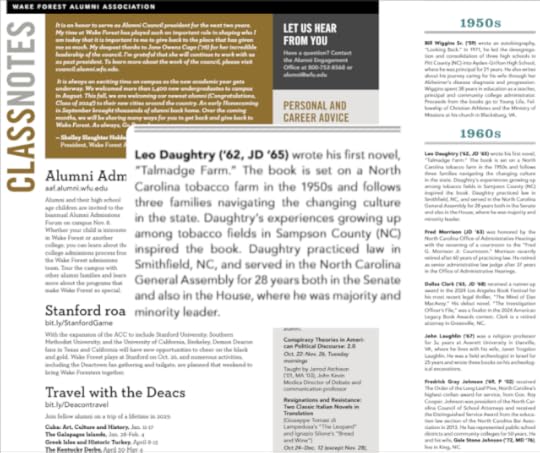
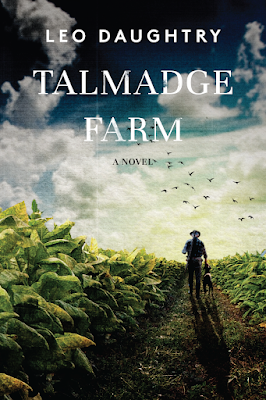
AVAILABLE ON AMAZON
"Talmadge Farm has often been described as a love letter to the South. Daughtry says, “Despite what the South has done and is doing, everybody loves the South. The South has a charm about it, and this book talks about the good parts of the South, how good the people are, and what the South has meant to so many of us… It’s a love story in many respects.”
October 14, 2024
Join Story Merchant's Virtual Book Launch on October 16th!
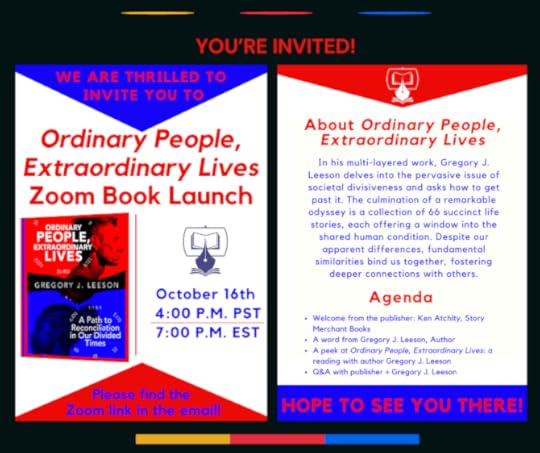
https://us02web.zoom.us/j/88528715474?pwd=MD2sKxGdO9ZQ7Sx7aZXt5VpL9WQIBq.1
Meeting ID: 885 28715474
Passcode: GREGIn his multi-layered work Ordinary People, Extraordinary Lives, Gregory J. Leeson delves deeply into the pervasive issue of societal divisiveness and asks how to get past it. To explore the roots of this division and find solutions, he embarked on an extensive 13-month, 26,403-mile road trip across North America. In visiting 53 cities in 39 states and eight provinces, Leeson delivered 19 speeches, conversed with nearly 1,000 people, and conducted in-depth interviews with 71 participants using a protocol developed by Dr. Dan P. McAdams, a pioneer in narrative psychology from Northwestern University.
The culmination of this remarkable odyssey is a collection of 66 succinct life stories, each potentially resonant with the reader’s own experiences, offering a window into the shared human condition. The book also features 52 viewpoints on the present state and future trajectory of the United States. In the chapter “What Would You Do,” Leeson presents thought-provoking questions, including a universal one, in a unique way that compels introspective responses.
Central to Leeson’s thesis is the assertion that despite our apparent differences, our fundamental similarities bind us together, fostering deeper connections with others. For those who embrace the opportunity to employ McAdams’ interview protocol, the journey promises a transformative and cathartic experience, enriching an understanding of oneself and others.
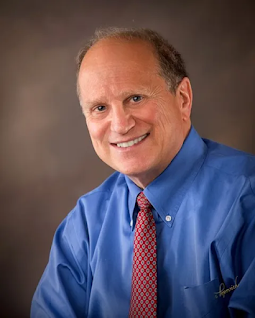 Gregory J. Leeson
Gregory J. LeesonAuthor, Speaker, TED Talk Nominee
October 11, 2024
Guest Post: Can We Grow Our Spirits As Fast As Our Tech?
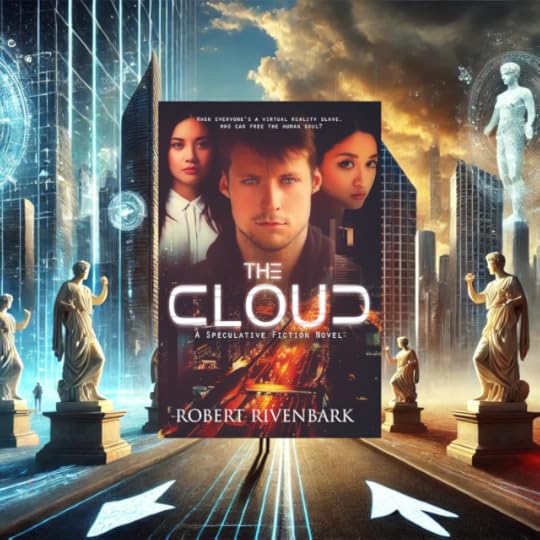
Get The Cloud: A Speculative Fiction Novel On Amazon Today!
We’re plunging into a future of stupendous technological wonders. AI. VR. Bioengineering. Can we manage these breakthroughs wisely—or will they destroy us?
After Europe rediscovered classical Greek philosophy through medieval Arabic translations, it sparked the Renaissance, Enlightenment, and Industrial Revolution. Stupendous achievements. But at what cost?
As literacy, technology, and science expanded, so did the human ego. Eventually, many felt the ego had replaced God.
But humanity can’t live without worship. The result: disastrous social and political revolutions: fascism, communism, Nazism—regimes worshipping strongmen such as Hitler, Stalin, and Mao.
Those who don’t worship charismatics tyrants can worship science and technology instead. Science and technology answer the deep human yearning to know “How can we do it?” But they can’t answer, “Why should we do it? And what will it mean if we do?”
Robert Rivenbark’s speculative fiction novel THE CLOUD dramatizes the horrors we may face if we can’t reconnect with our spiritual roots. We’re becoming a race of technocratic supermen with the maturity of infants. Can we save ourselves in time?
Visit www.thecloudnovel.com to learn more.
October 9, 2024
Dennis Palumbo - How Therapists Are Depicted In Film & Television
On The Stuph File Program radio show, Dennis Palumbo, one of my favorite mystery writers, is also a psychotherapist. He talks about how his profession is depicted in film & television.
He wrote an essay for Ellery Queen Mystery Magazine about this topic entitled "Your Shrinks Might Need To Be Shrunk". He was also the Consulting Producer on the recent Hulu series, "The Patient", which is about a therapist held hostage by a serial killer hoping to be cured of his homicidal tendencies. His thriller series contains six Dr. Daniel Rinaldi novels, with the latest one being "Panic Attack."
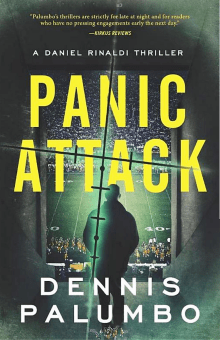
Available on Amazon
October 4, 2024
CAPESTER A Hero Bureau Thriller' by Peter G. Bielagus Book Trailer
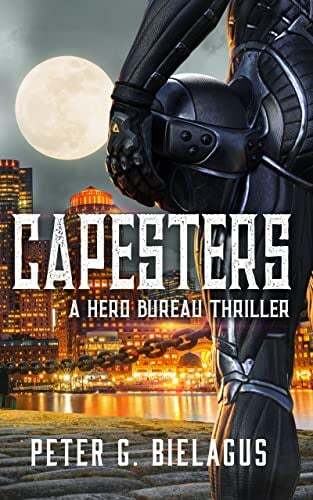
AVAILABLE ON AMAZON
The Hero Registration Bureau never had to worry about unlicensed heroes–Rogues–and neither did disgraced NYPD detective, Stan Magreen.
But when a seven-and-a-half-foot armored Rogue begins a nationwide killing spree, Magreen is coaxed into the case; not just because he's a good detective...
But because he was the first Rogue.
It's 2025 and the United States Federal Government has passed The Vigilante Act, allowing private citizens to operate as for-profit crime fighters. Within weeks America is under "Cape Craze."
Under the jurisdiction of the Hero Registration Bureau (HRB), Registered "Heroes" are popping up in major cities, hitting the streets, solving crimes, raiding warehouses all while grabbing the action on video. The video is then edited, sold and the profits - from toys, to video games, to tv shows - flood in.
These celebrity heroes have followed the law until the giant Rogue, Lahmi, begins a campaign of terror against the criminal underworld, threatening the entire Vigilante Movement.
As the FBI and the HRB scour the country in search of Lahmi, others join in, including the brilliant criminologist turned vigilante journalist, Maria Gomez. Magreen and Gomez meet in Boston for the final showdown with Lahmi, where Magreen wonders if his past has finally caught up with him.
October 2, 2024
Letter of His Holiness Pope Francis on the Role of Literature in Formation
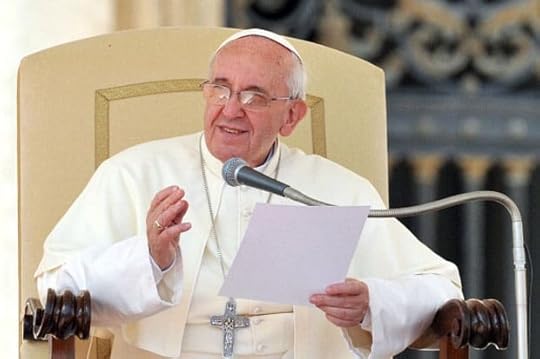
Literature is not just a means of entertainment but a vehicle for exploring and understanding the depths of the human soul, fostering a fruitful dialogue with contemporary culture, and enhancing the empathetic and pastoral capacity of ecclesial workers. Pope Francis calls for a radical shift in the formation of priests, valuing literature as an essential component of their educational journey:
“With this writing, I wish to propose a radical shift concerning the great attention that, in the context of the formation of candidates for the priesthood, must be paid to literature.”Summary and Commentary of the ChaptersPope Francis begins by emphasizing how the reading of novels and poetry is crucial in the personal maturation journey of every Christian, including priests and pastoral agents. He notes that finding a good book can offer relief during moments of solitude and difficulty, opening new inner spaces and preventing entrenchment in obsessive ideas. In an era dominated by digital media, this practice retains its irreplaceable value.
The Pope reflects on the active role of the reader in enjoying a literary work. Unlike audiovisual media, reading stimulates the imagination and creativity, allowing the reader to rewrite and expand the text with their personal experience. This process enriches both the reader and the work itself, creating a unique and personal synthesis with each new reading.Pope Francis criticizes the scant attention paid to literature in the training paths of future priests. He argues that neglecting literature leads to intellectual and spiritual impoverishment, depriving seminarians of privileged access to the heart of human culture. He thus proposes a radical change that integrates literature as an essential part of priestly formation.
The Holy Father highlights how literature allows for an authentic dialogue with contemporary culture. Quoting the Second Vatican Council, the Pope states that literature expresses the human condition, illustrating its joys and sufferings. Ignoring literature means losing the opportunity to understand and interact with various cultures and their deepest expressions. Sharing his experience as a literature teacher, Pope Francis recounts how he encouraged his students to read authors they were interested in, then guided them towards a broader passion for literature. This method has shown that approaching literature through what one loves can lead to a deeper and more lasting discovery of the love of reading.
Faith and cultureFor a believer, literature becomes an indispensable means of entering into dialogue with the lives of people and the culture of their time. The Pope reiterates that literature, by expressing real life events, allows one to speak to the hearts of men and grasp the presence of the Spirit in human events.
“Contact with different literary and grammatical styles will always allow for deepening the polyphony of Revelation without reducing or impoverishing it to one’s historical requirements or mental structures.”Never a Christ without fleshPope Francis draws attention to the current religious context, characterized by a return to the sacred and a spiritual quest that can be ambiguous. He emphasizes the importance of not offering a “Christ without flesh” but of proclaiming an incarnate Jesus Christ, made human and historical. This is essential to adequately respond to people’s thirst for God. According to the Pope, literature helps future priests develop a sensitivity to the full humanity of the Lord Jesus, allowing them to proclaim the Gospel in a way that truly touches the concrete lives of people.
“an assiduous frequentation of literature can make future priests and all pastoral agents even more sensitive to the full humanity of the Lord Jesus, in which His divinity is fully poured out, and to proclaim the Gospel.”A great goodIn this chapter, Pope Francis illustrates the multiple practical benefits of reading. Reading improves vocabulary, stimulates imagination and creativity, helps to express oneself better, improves concentration, and reduces stress and anxiety. Moreover, reading prepares people to understand and face various life situations. Quoting famous authors, the Pope highlights how reading allows one to live intense and diversified experiences in a short time, broadening our understanding of the world and of ourselves.
“In reading, we dive into the characters, the concerns, the dramas, the dangers, the fears of the people who have ultimately overcome the challenges of life.”Listening to someone’s voicePope Francis cites Argentine writer Jorge Luis Borges, highlighting the importance of direct contact with literature and “listening to someone’s voice.” Reading sensitizes one to the mystery of others and helps to touch their hearts. This process is essential for believers and particularly for priests whose task is to touch the hearts of contemporary human beings. Literature and poetry, with their ability to move, offer an unparalleled contribution to this effort.
“Here is a definition of literature that I like very much: listening to someone’s voice. And do not forget how dangerous it is to stop listening to the voice of the other who calls out to us!”A sort of gym of discernmentLiterature is described as a “gym of discernment” that refines the inner and outer scrutiny capacities of future priests. By reading, seminarians learn to navigate between salvation and perdition, living the act of reading as a process of discernment. Literature stimulates the reader to explore their own inner truths, offering a safe space to confront anxieties and spiritual crises. This exercise is compared to the Ignatian experience of “desolation,” where inner turmoil can lead to greater awareness and growth.
“The act of reading is then like an act of “discernment,” thanks to which the reader is personally involved as a “subject” of reading and at the same time as an “object” of what he reads.”
Attention and digestionAccording to Pope Francis, reading is like a “telescope” that focuses on the complexity of human experience. Literature helps to slow down, contemplate, and listen, counterbalancing the tendency towards efficiency and superficiality. The reading process is compared to “digestion,” an action that allows one to assimilate and interpret life in depth. This hospitable approach to reality fosters a more complete and sensitive understanding of people and situations.
“literature helps us to say our presence in the world, to “digest” and assimilate it, capturing what goes beyond the surface of life; it serves, therefore, to interpret life, discerning its fundamental meanings and tensions.”Seeing through the eyes of othersBy reading, one acquires the ability to “see through the eyes of others,” expanding our humanity and developing empathy. Literature allows us to identify with the experiences of others, fostering solidarity, compassion, and mercy. This process makes us more sensitive to the sufferings and joys of others and helps us better understand their lives and desires. Reading thus becomes an experience of personal growth and human sharing.
“When one reads a story, thanks to the author’s vision, everyone imagines in their own way the tears of an abandoned girl, the elderly woman covering her sleeping grandson’s body, the passion of a small entrepreneur trying to move forward despite difficulties, the humiliation of one who feels criticized by everyone, the boy who dreams as the only way out of the pain of a miserable and violent life.”The spiritual power of literaturePope Francis concludes by highlighting the crucial role of literature in the education of the heart and mind of future priests. Literature frees language from static conventions, allowing for greater spiritual openness. Furthermore, it recalls the primary task entrusted by God to man: to “name” beings and things, giving them meaning and creating communion. This affinity between priest and poet manifests in a ministry of listening and compassion, where the literary word becomes a vehicle for the divine Word.
“The spiritual power of literature finally recalls the primary task entrusted by God to man: the task of “naming” beings and things (cf. Gn 2:19-20). The mission of guardian of creation assigned by God to Adam passes first and foremost through the recognition of the reality and meaning of the existence of other beings. The priest is also invested with this original task of “naming,” of giving meaning, of becoming an instrument of communion between creation and the Word made flesh and of its power to illuminate every aspect of the human condition.”Literature as an access route to the mysteries of manThe Pope concludes by affirming that literature uncovers the abysses of the human soul and helps pastors engage in fruitful dialogue with contemporary culture. Literature is an “access route” that makes future priests more sensitive to the full humanity of the Lord Jesus, promoting a proclamation of the Gospel that authentically resonates in the hearts of people.Pope Francis’s letter is an invitation to rediscover the spiritual power of literature in priestly formation. For the missionaries of the Congregation of the Mission, this means embracing reading as a tool for personal and pastoral growth, to better understand and accompany humanity in its search for meaning and redemption. Literature thus becomes an indispensable traveling companion for every missionary, capable of enriching their vocation and service. Especially for confreres engaged in Vocational Pastoral Ministry, literature can be the means to help in discerning those young people who wish to approach the Vincentian charism to clothe themselves in Christ and to serve the poor in the best possible way!
Girolamo GrammaticoCommunication OfficeVia Congregation of the Mission Global
September 30, 2024
Story Merchant E-Book Deals: Capesters A hero Bureau Thriller by Peter G. Bielagus Free September30 - October 4!
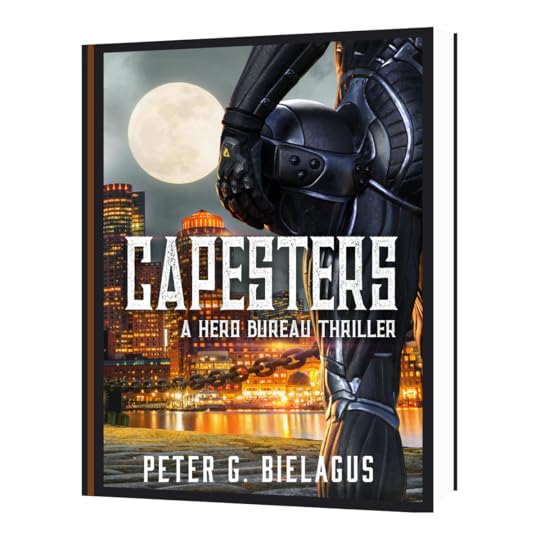
Capesters: A Hero Bureau Thriller
by Peter G. Bielagus
It's 2025 and the United States Federal Government has passed The Vigilante Act, allowing private citizens to operate as for-profit crime fighters. Under the jurisdiction of the Hero Registration Bureau (HRB), Registered "Heroes" are popping up in major cities, hitting the streets, solving crimes, raiding warehouses all while grabbing the action on video. When a seven-and-a-half-foot armored Rogue begins a nationwide killing spree, disgraced NYPD detective Stan Magreen is coaxed into the case; not just because he's a good detective but because he was the first Rogie.
September 28, 2024
You can now LISTEN to Leo Daughtry's Talmadge Farm on Audio!
It's 1957, and tobacco is king. Wealthy landowner Gordon Talmadge enjoys the lavish lifestyle he inherited but doesn't like getting his hands dirty; he leaves that to the two sharecroppers - one white, one Black - who farm his tobacco but have bigger dreams for their own children. While Gordon takes no interest in the lives of his tenant farmers, a brutal attack between his son and the sharecropper children sets off a chain of events that leaves no one unscathed.
AVAILABLE ON AMAZON




